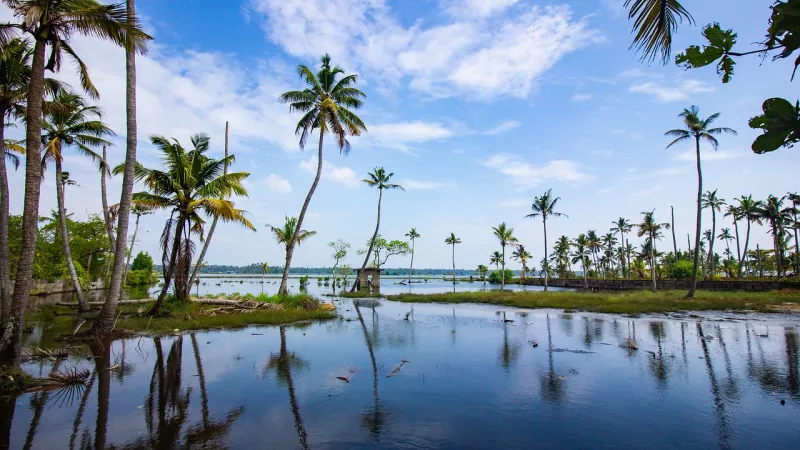Backwaters Travel Guide
Backwaters, located in the southern part of India, is famous for its intricate network of interconnected rivers, lakes, and canals. This picturesque region is renowned for its serene houseboat cruises, lush greenery, and traditional Kerala culture.Top Attractions in Backwaters
- Houseboat Cruises
- Kumarakom Bird Sanctuary
- Alleppey Backwaters
- Vembanad Lake
- Snake Boat Races
Backwaters is Famous for
Backwaters is most famous for its mesmerizing houseboat cruises that offer a unique way to experience the natural beauty of Kerala.Top Attractions in Backwaters
- Exploring the backwaters on a traditional houseboat
- Visiting the Kumarakom Bird Sanctuary
- Witnessing the vibrant Snake Boat Races
- Relaxing by the serene Vembanad Lake
- Experiencing the charm of Alleppey Backwaters
What's Great about Travelling to Backwaters?
- Perfect for nature lovers and peace seekers
- Unique houseboat experience
- Opportunity to explore Kerala's rich culture
What's Not So Great about Travelling to Backwaters?
- May not be ideal for adventure enthusiasts
- Limited nightlife options
- Not suitable for travelers seeking a bustling city experience
Travel Tips for Backwaters
- Check weather conditions before planning your trip
- Book houseboat cruises in advance
- Respect the local customs and traditions
Important Backwaters trip information
- Ideal Duration: A 3-4 day trip is ideal to explore the backwaters.
- Best Time to Visit: The best time to visit is from October to March when the weather is pleasant.
- Nearby Airports and Railway Stations: Cochin International Airport and Alleppey Railway Station are the nearest transportation hubs.
FAQ's on Backwaters
Q1: What is the best time to visit Backwaters?
The best time to visit Backwaters is during the winter months from November to February when the weather is pleasant and dry, making it ideal for exploring the serene backwaters. This time also coincides with the peak tourist season, offering various cultural events and festivals to experience.
Q2: Do I need a visa to travel to Backwaters?
Tourists traveling to Backwaters require a valid visa. However, some nationalities may be eligible for visa-on-arrival or e-visa facilities. It is essential to check the specific visa requirements based on your nationality before planning your trip to Backwaters.
Q3: What are the must-visit attractions in Backwaters?
The must-visit attractions in Backwaters include cruising through the backwaters on traditional houseboats, exploring the lush greenery of Kumarakom Bird Sanctuary, visiting the historic St. Mary's Forane Church, and experiencing the vibrant culture of Alleppey.
Q4: Is Backwaters a safe place to travel?
Backwaters is generally a safe destination for travelers. However, it is advisable to be cautious of your belongings and avoid isolated areas, especially at night. Always follow basic safety precautions and stay informed about local conditions during your visit.
Q5: What is the local currency in Backwaters and can I use credit cards?
The local currency in Backwaters is the Indian Rupee (INR). While credit cards are accepted in major hotels, restaurants, and shops, it is advisable to carry cash for smaller establishments and local markets. ATMs are widely available in tourist areas for convenient currency exchange.
Q6: What is the local cuisine like in Backwaters?
Backwaters offers a delightful culinary experience with its traditional Kerala cuisine, featuring dishes like seafood specialties, coconut-based curries, and appam with stew. Vegetarian options are also widely available, catering to various dietary preferences of travelers.
Q7: What transportation options are available in Backwaters?
Transportation options in Backwaters include traditional houseboat rides, public ferries, buses, and taxis for exploring the region. Rental services for bicycles and motorbikes are also available for those seeking independent travel experiences.
Q8: Are there any cultural norms or etiquette I should be aware of when visiting Backwaters?
When visiting Backwaters, it is important to respect the local customs and traditions. Dress modestly, especially when visiting religious sites, and remove footwear before entering homes or places of worship. Greeting locals with a "Namaste" and asking for permission before taking photographs are considered polite gestures.
Q9: I am a travel agent. How can I buy travel leads of Backwaters?
Register yourself as a travel agent at agents.tripclap.com and then you can buy travel leads to Backwaters once your account is approved. For more details contact our support team at +91-8069186564 or support@tripclap.com

